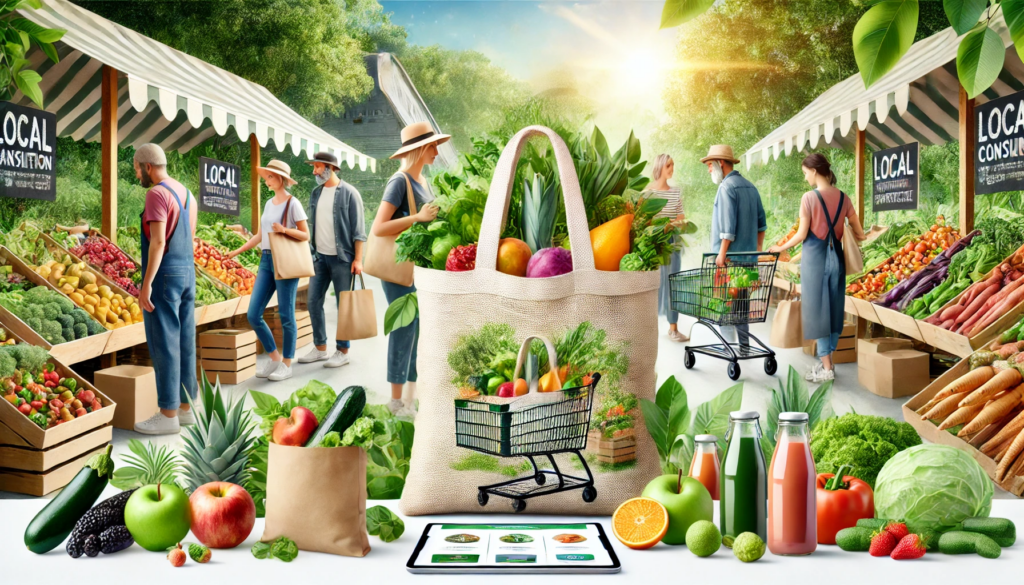While walking down the street, I saw a mother and her child with bags full of items. They seemed happy, but I felt uneasy. How many things did they really need? Would they be used and discarded properly?
These doubts made me think about how to live more sustainably. Starting with consumption habits is a good starting point.
Key Lessons Learned
- Responsible consumption is essential for reducing our environmental impact and building a more sustainable future.
- Practices like waste reduction, reusing, and recycling can make a big difference in our daily lives.
- Choosing local, organic, and fair trade products also contributes to a more sustainable economy.
- Adopting a more conscious lifestyle benefits not only the environment but also our financial health and well-being.
- Involving the whole family in the responsible consumption process strengthens bonds and teaches important values to future generations.
What is Responsible Consumption?
Responsible consumption is a set of actions and principles that help us buy, use, and dispose of products consciously. Understanding how our actions affect the environment is crucial. Our choices can destroy the planet and impact future generations.
It’s important to make choices that have positive effects or minimize negative effects on nature.
Definition and Key Concepts
Responsible consumption includes conscious and green practices. But green consumption is not enough. It does not guarantee equal access to natural resources, depending on purchasing power.
To change, we need to rethink our purchases. It’s not enough to switch to green products. We need to change our habits and reflect before buying.
Difference Between Sustainable, Green, and Responsible Consumption
Responsible consumption includes conscious and green practices. Green consumption is a step towards sustainability, but it doesn’t solve all problems. It overlooks equal access to natural resources.
To change, we need to rethink our purchases. It’s not enough to choose green products. We need to change our habits and think before buying.

Sustainable consumption focuses on environmental preservation. Responsible consumption goes further, considering the social, ethical, and economic consequences of our choices.
Importance of Responsible Consumption
Responsible consumption is very important for taking care of the environment. Every action we take helps improve the world. Between 1970 and 2014, Earth lost 60% of vertebrate animal species. Now, 42% of land species, 34% of aquatic species, and 25% of marine species are at risk.
Additionally, 8 million tons of plastic are dumped into the oceans every year. This severely harms marine life.
Environmental Impacts of Uncontrolled Consumerism
Consumerism without control is destroying the environment. 42% of Brazilians changed their consumption habits in 2019 to help the planet.
Collective Benefits of Adopting a Sustainable Lifestyle
- Access to healthier products with fewer harmful substances
- Greater availability of natural resources due to reduced waste
- Reduction in pollution and greenhouse gas emissions
- Generation of green jobs and sustainable business opportunities
- Improvement in quality of life and public health
A report on ethical consumption in the UK shows that the market grew from £11.2 billion in 1999 to £122 billion in 2020. This shows that more people want sustainable products and services.
| Indicator | Data |
|---|---|
| Consumers who changed habits to reduce environmental impact | 42% |
| Consumers paying attention to product ingredients | 30% |
| Consumers avoiding companies with animal testing | 58% |
| Consumers avoiding companies with slave labor | 65% |
| Consumers trying to reduce disposable plastic use | 61% |
| Consumers stopped buying for ethical/sustainability reasons | 33% |
Therefore, responsible consumption is an effective way to combat the environmental impacts of consumerism. It helps create a more sustainable society, benefiting everyone.
Circular Economy and Its Relation to Responsible Consumption
Circular economy aims to keep products and materials in use for longer. This reduces waste and environmental impacts. Unlike the linear model, which consumes and discards, circular economy reuses and recycles, avoiding waste.
The relationship between the circular economy and responsible consumption is key to sustainability. Consuming responsibly means choosing products that do not harm the environment and that can be reused. This helps reduce environmental impact and conserve resources.
Countries like the Netherlands and Germany are leading the transition to a circular economy. Belgium also has a strong focus on this model. In Brazil, about 75% of companies have already adopted circular economy practices, but many do not recognize it.
To implement the circular economy and responsible consumption, joint work between government, companies, and society is necessary. This partnership can create value, reduce environmental impacts, and lower costs.
“The circular economy strengthened at the end of the 1970s and proposes a more sustainable model, an opportunity to redefine the future.”
With the population growth projected by the UN, Circular Economy and Responsible Consumption practices are more important than ever. They ensure the sustainability of the planet.
Main Practices of Responsible Consumption
- Rethinking purchases and avoiding unnecessary products
- Prioritizing quality over quantity to reduce waste
- Supporting companies with sustainable practices and ethical standards
- Reducing energy and water consumption
- Opting for products with eco-friendly packaging
- Adopting recycling and composting practices at home
- Educating oneself and others about responsible consumption
- Participating in community initiatives for sustainability
By following these practices, we can contribute to a healthier planet and a better quality of life for everyone.
